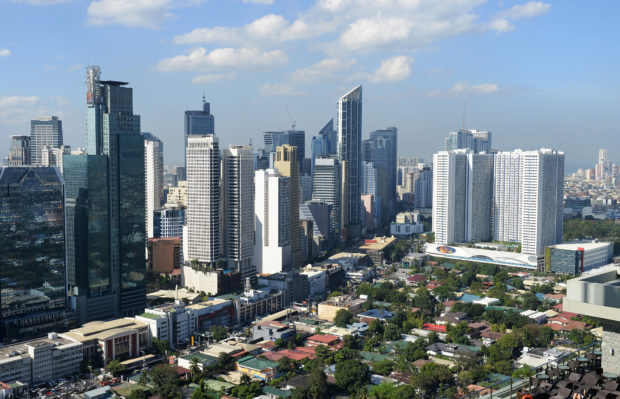Dominguez: PH economy to ‘boom’ postpandemic

This photo taken on January 29, 2019 shows a general view of the skyline of the financial district of Makati in Manila. (Photo by Ted ALJIBE / AFP)
Not even next year’s presidential elections and the forthcoming administration change will stop the Philippines from booming postpandemic, with its young population expected to move the economy forward, Finance Secretary Carlos Dominguez III said.
“We have a long history of continuity in the economic field, from the time of [former President] Cory Aquino in the mid-1980s” up to the current Duterte administration, Dominguez told CNBC in an interview on Monday. He was agriculture secretary during the Cory Aquino administration.
A number of think tanks had already flagged political risks, which could spill over to economic prospects with the May 2022 elections fast approaching.
“Our financial and economic policies have been very, very stable. Of course, different administrations have different emphasis, and, of course, [they] have different political capital and political will. But essentially, the economic policies have been very stable,” Dominguez said.
As President Duterte’s chief economic manager, Dominguez already offered to help the incoming administration during its transition to power.
Article continues after this advertisementHe wanted the current economic team to brief their successors about future prospects and challenges—Dominguez had pointed to growing debt, high global inflation, wider income inequality locally and worldwide, plus climate change among the issues, which the next president needed to address.
Article continues after this advertisementAsked what would make the Philippines more appealing to foreign investors compared to its neighbors, Dominguez replied: “We have a very robust economy. We are enjoying our demographic sweet spot.”
“Our average age here right now is 25, and we are very well-educated. In fact, Filipinos are in-demand across the world,” he added.
Dominguez also noted that the Philippines grew by an average of 6.6 percent yearly pre-pandemic. But gross domestic product shrank by a record 9.6 percent in 2020—the worst annual recession post-war—as a result of the then longest and most stringent COVID-19 lockdown in the region. This year, the government expects a return to GDP growth of 4 to 5 percent as the economy emerged from strict quarantine restrictions.
For Dominguez, the Philippines was “a very good place to invest.”
“As soon as we overcome the COVID-19 contagion, I believe our economy is going to boom,” he said.
The government targets 7 to 9 percent GDP expansion next year and 6-7 percent yearly in 2023 and 2024—a return to prepandemic growth rates in the short to medium term.
However, economists had flagged long-term scarring effects on the economy of the pandemic-induced recession, prolonged closure of in-person classes in schools, plus the temporary return to poverty among vulnerable sectors.